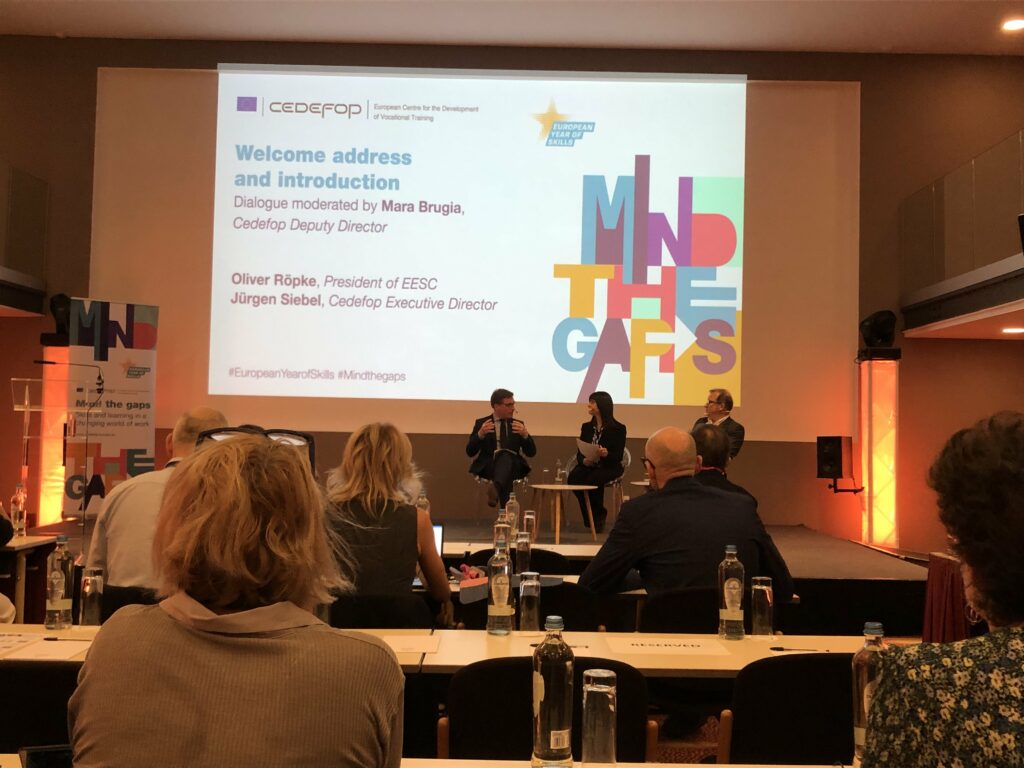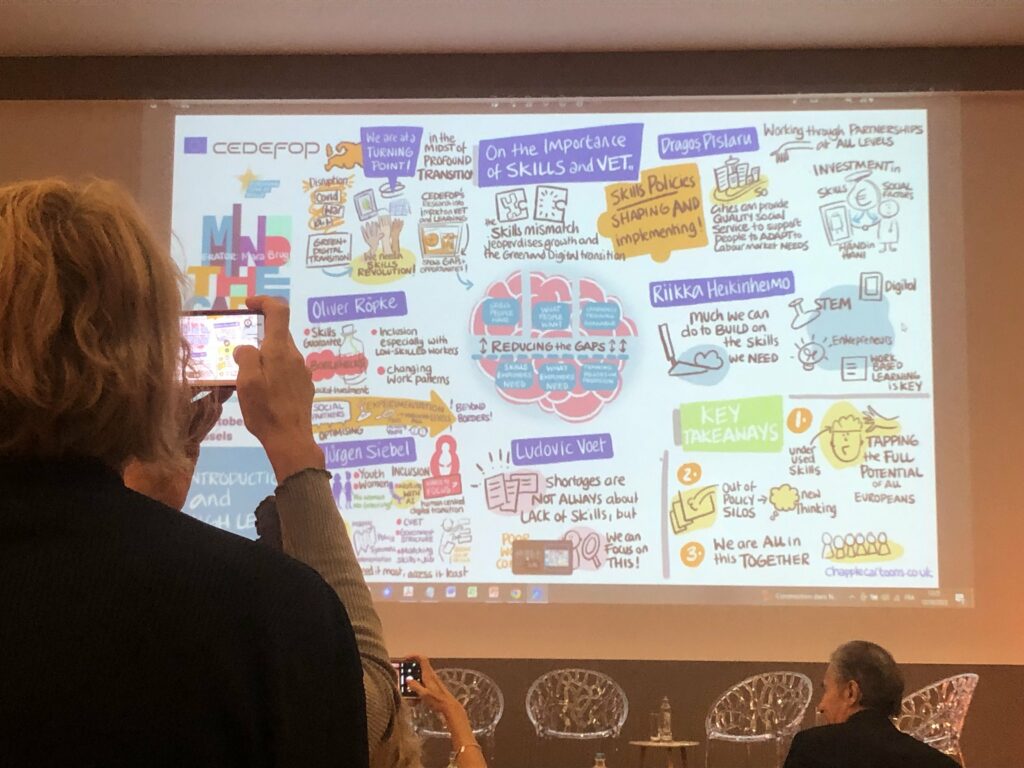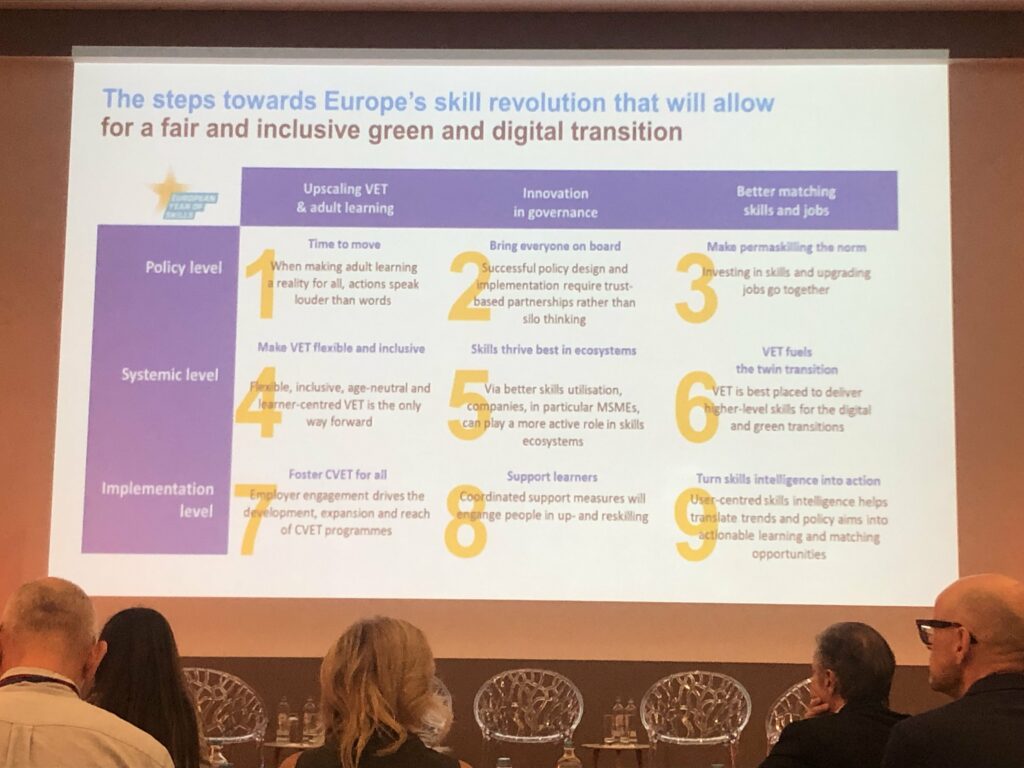Mind the Gaps: steps towards the skills revolution
13/10/2023

Cedefop, the European Centre for the Development of Vocational Training, organised a flagship event on skills transformation and revolution on Thursday 12 October in Brussels.
The European Commission Agency’s “Mind the gaps: Skills and learning in a changing world of work” conference took place in the context of the European Year of Skills. The event brought together policymakers, social partners, business federations, academics, national, local, and public authorities, and VET providers to reflect on how to better match VET, skills and qualifications with the evolving needs of the workforce and wider society.
Cedefop presented its matrix that gathers the steps towards Europe’s skills revolution that will allow for a “fair and inclusive green and digital transitions.” Three steps will be necessary upscaling VET and adult learning, innovation in governance and better matching skills and jobs. Cedefop introduced for each of them actions at policy, systemic and implementation level.
Social inclusion is essential
The conference started with a dialogue between Oliver Röpke, President of EESC (European Economic and Social Committee) and Jürgen Siebel, Cedefop Executive Director. Inclusion was one of the main aspects that both speakers highlighted. Mr Röpke said that inclusion is crucial to fostering the skills revolution. Mr Siebel joined him by adding that it is necessary to look at gender disparities too. He stated, “No women, no green”, meaning that to reach the Green Deal’s ambitions Europe needs a higher participation of female workers in green jobs. Both speakers also stressed the relevance of training young people in fields such as Artificial Intelligence, but also the importance of addressing the demographic challenges.
The event was divided into three-panel discussions to reflect on the main gaps that impact the skills
revolution:
- The gap between skill demand and supply
- The gap between people’s and employers needs
- The gap between training policies/provisions and needs

In the first panel on skills demand and supply aspects of tensions and imbalances, speakers emphasised the importance of the green transformation and its connection with the skills revolution. All agreed that skills intelligence is crucial to understanding what is happening in the labour market. In addition, it was mentioned the relevance of work at the regional level, where the real skills transformation can start. Aligned with this, EARLALL highlights in its five-year strategic plan that individuals need to be equipped with the necessary knowledge, skills, and competencies to contribute to the green economy, adapt to technological advancements and participate actively in a rapidly changing society.
A companies management shift is needed
The second panel was focused on the attractiveness of IVET for young people. The reputation and stigmas that the VET system has to deal with in many countries were one of the topics discussed by the speakers. Unfortunately, according to Cedefop intelligence, VET is still seen as a second choice. Jacqueline Tanzer (WorldSkills Champions Trust, Austria), said that to change this perception also employers need to create new working environments, adapting to the new generation’s needs, for instance taking into account the well-being of employers. Therefore, to attract young people companies need a management shift. One issue flagged by Gina Eber (EAEA) is the need to support SMEs. Big companies can provide training for their employees while SMEs are struggling to find funding or even the time to offer this training opportunity. Today, people see the rewards that learning can bring to individuals. Concluding, Jacqueline Tanzer asked policymakers to stop talking and start acting, as the skills revolution discussion started yesterday and we are still seatting and discussing, so this is not enough.
Let’s bring the skills revolution out of the “Brussels bubble”
Vice-President of the European Commission, Margaritis Schinas, joined the event stressing that skills shortages and labour mismatches are becoming endemic problems. He added that the VET sector has a crucial role to play in the twin transition, as VET programmes are well aligned with the needs of the economy. However, a collective effort is needed to boost the attractiveness of VET. Furthermore, the Vice-President asked the participants to bring the skills revolution out of the ‘Brussels bubble’. He announced that the EU Talent Pool Pilot will be launched in mid-November. This initiative aims to encourage third-country nationals to enter the European labour market with legal contracts. A second initiative is the European Degree through the European Universities Alliance.
A decade of Skills

Back to the panel discussions, the afternoon was dedicated to reflecting on how to fill the gaps between training policies/provisions and needs and looking beyond the European Year of Skills. Once again, the question of VET enrolment and attractiveness was mentioned by the OECD, but also the importance of the quality assurance of the VET programmes. The quality will have an impact on learners’ motivation.
The audience was asked to share their thoughts about the “learner-centre approach”. Giulia Meschino (EVTA), VET provider representative, shared that in her opinion a learner-centred approach should be based on being a “be a maker”. She explained that she was inspired by a good practice from the Wallonian region (Belgium), Technobel. This is a training centre that follows a training methodology named “Be a Maker” – launched in 2013 – based on learning by doing, supporting students, validating competencies (with Digital Badges) and collaborating with companies. Meschino stressed that Europe needs more flexible and adaptable education paths based on the needs of learners.
The event was wrapped up with an open reflection about what’s next after the European Year of Skills. The ambition would be to become the decade of Skills. The business representatives asked to look at the skills not as a cost but as an investment and asked for more public investment in the VET sector. Industrials asked for a ‘right to training’ to ensure that workers get access to training on the job. Flemish government representative, emphasised the crucial role of a lifelong learning mindset as Europe is not there. That’s why the next Belgium Presidency of the Council of the EU plans to organise a conference on lifelong learning on 17-18 April 2024.
Cedefop’s director closed the conference by saying that a skills revolution needs to go beyond and that we need to work closer to the ground.
EARLALL, following its strategic priorities, will continue the skills transformation discussion at the regional level.




